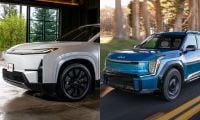The comment made this month in my sales comparison between the Nissan Leaf and the Chevrolet Volt comes from reader Bluephrog, who made the following comment:
Why do you continually compare the Volt to the Leaf. The Volt is a hybrid and the Leaf is all electric. The Volt sales should be compared to the Toyota Prius sales or any other Hybrid. The Leaf should be compared to the Tesla or Fisker. Or, I know, go out on a limb and compare the Volt to the new Tesla S.
Click here for a look at the September 2012 sales piece for the Nissan Leaf and Chevrolet Volt.
The reason that I compare the Nissan Leaf to the Chevrolet Volt is because they are the only two mainstream electric-drive vehicles available in the US.
Bluephrog is right that the electric vehicles from Tesla could be a closer comparison for the Nissan Leaf due to their all-electric drivetrain and the Fisker Karma is technically a better comparison to the Chevrolet Volt due to the range-extending gasoline engine. However, when you consider the extremely low production volume, the high price and the high performance aim of both the Tesla Model S and the Fisker Karma - those people looking to buy a Tesla or Fisker are a very different crowd from the folks buying a Leaf or Volt. I’m sure that marketing people from Tesla, Fisker, Nissan and General Motors would all agree strongly on that point. I could just as easily throw in the Coda Electric Sedan, the Mitsubishi I-MiEV and the Ford Focus Electric – and I plan to when those models are selling in significant enough quantities to pose a real challenge to either the Leaf or the Volt.
When it comes down to it, I do a sales comparison between the Nissan Leaf and the Chevrolet Volt because they are the two highest volume vehicles in the US that offer significant pure electric range. The Volt is not a gasoline hybrid with a traditional engine/transmission drivetrain being aided by an electric assist system connected to the transmission - it is an electric drive vehicle with a range extending battery engine. It is basically like a motor home having an on-board generator to charge the batteries that run the accessories – except the Volt’s 1.4L engine charges the battery that drives the wheels.
The Chevy Volt gasoline engine cannot provide motive power to the wheels like the Toyota Prius or Ford Fusion Hybrid. You could literally remove the gasoline engine from the Volt and it would operate in the same manner as the Nissan Leaf or you could run the Volt completely dry of gasoline and it would still run on electric power (provided that the battery is charged). Neither of these facts are true of a hybrid like the Prius, Sonata or Fusion and while the technology of the gas-electric hybrid is bringing about some all-electric driving - none of the top hybrids on the market today offer anywhere near the all-electric range of the Volt. A Volt owner can very realistically drive 35 miles a day – every day – and never burn a drop of gasoline. That is not true of any hybrid on the market but it is true of the Nissan Leaf.
The only mainstream vehicles available in the US right now that are selling at a significant pace that offer a real all electric driving range are the Nissan Leaf and the Chevrolet Volt. The fact that GM chose to add a range extending engine does not make it any less of an electric drive vehicle and with the growth of the EV segment, we can expect my monthly Volt-Leaf comparo to also include models like the Ford Focus Electric and maybe even the Fisker Atlantic. However, for the immediate future the Leaf and Volt are the only two mainstream, high volume vehicles on the market that offer real all –electric range and that is why I compare their sales each month.
Finally, one more reason why I compare the Nissan Leaf to the Chevy Volt is that when the Nissan Leaf was moving along at full steam in 2011 and it was comfortably beating the Volt every month – Nissan Motors frequently was quick to point out that their electric Leaf was badly outselling the electric Chevy Volt. Nissan also boasted of beating the Chevy Volt in annual EV sales through the 2011 calendar year. If the automaker is going to generate that comparison, I believe that is more than enough reason for the media to look at the two in a head to head venue as well. Funny that we don’t see many of those comparisons made by Nissan these days.
That being said, the staff at TorqueNews appreciates when any of our readers take the time to comment whether they agree with we are saying or not. I encourage all of you to let us know in the comment area here what faults you find with my reasons for comparing these two electric drive vehicles.
Set as google preferred source












Comments
Well, you're going to have to
Permalink
Well, you're going to have to start putting the Model S on this list very soon, they're looking at delivering over 1000 vehicles a month by the end of the year, and have reservations to fill for over 10,000 vehicles in 2013.
And I think the notion that "those people looking to buy a Tesla or Fisker are a very different crowd from the folks buying a Leaf or Volt." is faulty. From browsing the Tesla forums, there's at worst a significant minority of Model S reservation holders that currently own a Volt or Leaf, or at least a Prius. Many people in the market for EVs are just trying to get off gasoline by any means necessary, and would be looking at whatever it takes to do so in the market.
But when it comes down to it, even if the numbers are very low, people are curious. They want to see where EVs are in the market. If you have the numbers for the Karma, Model S, etc - even if they're just a footnote on the larger "Volt vs. Leaf" monthly report, toss them in the final paragraph. Keep us informed.
So.. people who own a $30,000
Permalink
In reply to Well, you're going to have to by archibaldcrane (not verified)
So.. people who own a $30,000 car are going to have no problem coming up with the jang to buy a $60,000+ car? You sure that's the same market?
Ya, there could be a few who will - and it wouldn't be surprising - but you're talking about double the price tag for a completely unproven vehicle at a time when most people are struggling just to put food on the table.
You are operating under the
Permalink
In reply to So.. people who own a $30,000 by Aaron Turpen
You are operating under the assumption that a wealthy person who wanted to get off oil 3 years ago wouldn't jump on the only option on the market (Volt or Leaf) at that time.
There are definitely some people who are making the hard decision between a Jaguar, an M5, and Model S - but I think there are equally as many making the decision between a Prius plug-in, a Leaf, a Volt, and a Model S - for different reasons obviously.
It's also hard to argue that the Model S is less proven now than the Leaf or Volt were at their release, but that's another conversation. My main point is, it's going to be selling at volumes that would definitely qualify it for this comparison by the end of the year, so it should be included in the roundup shortly.
Assuming Tesla's sales figure
Permalink
In reply to You are operating under the by archibaldcrane (not verified)
Assuming Tesla's sales figure estimates are accurate, which they never have been. Chevrolet's figures for the Volt were largely wrong as well. Same with Fisker. Nissan was close, but they based them on pre-sales, which were brisk.
I am operating under the assumption that while the first adopters will be the usual wealthy early adopter types, given Tesla's marketing, that will only be the case for the first year at best. They are clearly aiming at mainstream buyers, not early adopters.
Not according to Elon Musk,
Permalink
In reply to Well, you're going to have to by archibaldcrane (not verified)
Not according to Elon Musk, the company head at Tesla. He spoke to Bloomberg News in early October and he noted that the total 2012 production of the Tesla Model S had been slashed form a total of 5,000 units to about 3,200 units. To date about 250 have been delivered in the 5 months since the car was officially launched and offered for sale. The most recent news is that Tesla now has made about 1000 total frames for the Model S. if it takes 5 months to build 100o frames, Tesla will not be able to produce 1000 units per month in 8 weeks.
http://www.bloomberg.com/news/2012-10-03/tesla-ceo-says-u-s-bullish-on-electric-car-maker.html
But let's not let facts spoil the party.
If you actually read the
Permalink
In reply to Not according to Elon Musk, by John Goreham
If you actually read the transcript of the entire conference call from yesterday morning instead of just cherry picking in a feeble attempt to refute my point, you would see he said they produced 200 cars last week alone. Theyre in the middle of a steep ramp up in production, and I have little doubt that 1,000 cars will be produced in the month of December.
Chevrolet compares the Volt
Permalink
Chevrolet compares the Volt to the Leaf. In fact, the sales brochure does so specifically, listing the Leaf as it's only competition.